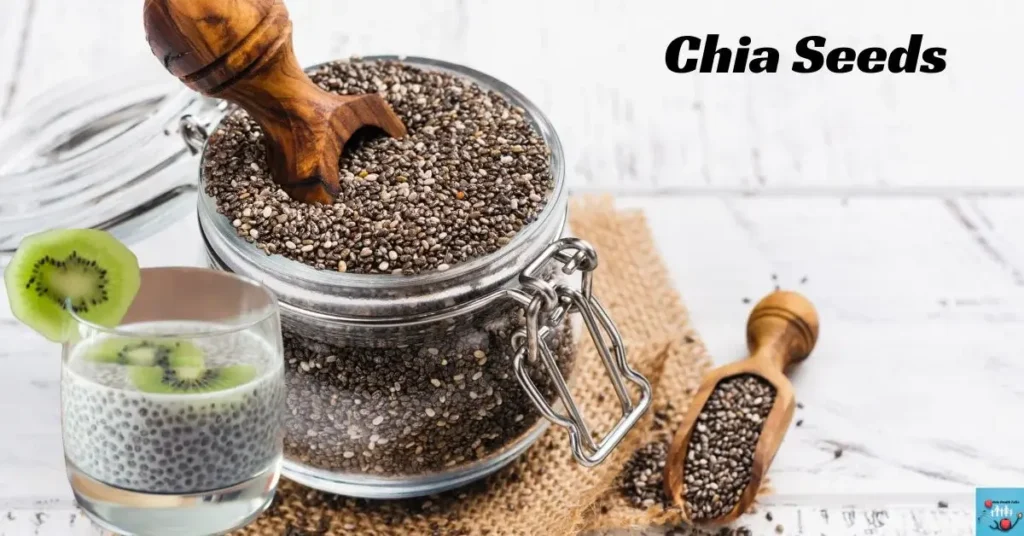Green Tea With Chia Seeds
Green tea with chia seeds is a popular beverage that is frequently connected with weight loss and a variety of health benefits. Both have their own nutritional Benefits Green tea stands as a powerhouse of (antioxidants) improved brain function, fat burning, etc., and chia seeds rich in (fiber, omega-3 fatty acids, protein, etc.). with high nutritional value. In this blog post, we will discuss the all details about green tea with chia seeds.
Tea’s Function On Human Health
Due to its high polyphenol content, investigations on animals have suggested that tea may have health benefits. Although they have not been as accurate, human studies are encouraging. Regular consumption of 2-3 cups of tea has been associated to a lower risk of heart disease, stroke, early death, and type 2 diabetes, according to an observational study.
After water, tea is the most consumed beverage worldwide. It’s as easy as pouring hot water over the Camellia sinensis plant’s cured leaves. In the third century AD, tea was first mentioned in writing as a therapeutic beverage in China. Its popularity traveled fast across continents thanks to merchants. The idea of afternoon tea—a departure from the daily routine in which tea is served with sandwiches and baked pastries like scones—was made popular in Great Britain in the early 1800s. The growing, processing, and harvesting locations of tea leaves all affect the flavor of the beverage. The most often consumed tea globally is black tea, which is followed by green, oolong, and white tea.
Like regular teas, which usually include caffeine, herbal teas are made from herbs that have been dried, spices, flowers, fruit, seeds, roots, or leaves of other plants instead of the Camellia plant.
1 Green Tea Overview:
Green tea is a type of tea made from the leaves and buds of the Camellia sinensis plant. Unlike black tea, it undergoes minimal oxidation, preserving its natural color and flavor. Green tea was developed in China around 2737 BC. The discovery happened by accident when the Chinese Emperor Shennong drank water that had a dead tea leaf boiling inside. He thought the flavor was pleasant, and thus a new beverage was born. Green tea was first documented in a tea-focused book authored by Lu Yu during the Tang period (618-907 AD).

Health Benefits of Green Tea:
Green tea contains polyphenol antioxidants, including (epigallocatechin-3-gallate) EGCG, a catechin. These antioxidants may provide a variety of health benefits. Such as :
- May improve cognitive function
- It May help with fat-burning
- lower the risk of cancers
- May protect the brain from aging
- It helps with oral health
- It helps with managing blood sugar
- Green Tea helps you live longer
- Boost Your Focus
- etc…..
Green Tea Disadvantages:
Green Tea Contain caffeine People who drink large amounts of caffeine for a longer time may experience some side effects on their body.
- Irritability,
- Insomnia,
- Heart palpitations,
- Dizziness,
- nausea,
- headaches,
When we consume caffeine in overdose, all these side effects can be seen. So take it in limit or avoid in the evening. Case study
2 Chia Seeds Overview:
Chia seeds are tiny, spherical seeds that come in black, brown, or white hues. They were derived from Salvia hispanica, a blooming plant in the mint family. It is found in several regions of Guatemala and Mexico, Bolivia, and Central and South America. Though they are not the same seed, edible chia seeds are closely linked to the chia plants that Chia Pets popularized. The first historical documentation of chia seeds being used dates back to 3500 B.C., as it was one of the Aztec empire’s main sources of food.

When chia seeds are mixed with liquid, they form a gel around them, giving chia beverages their distinct texture. Chia seeds have the ability to absorb up to 12 times their weight in liquid, making them useful for keeping baked goods moist.
Health Benefits Of Chia Seeds
Chia is also a superfood full of (high-fiber omega-3 fatty acids, protein, etc.) that improve heart health, reduce cholesterol levels, promote gut health, and more.
Chia seeds are a great source of vitamins, minerals, and antioxidants. Among these antioxidants are Found:
- Caffeic acid
- Kaempferol
- Quercetin
- Chlorogenic acid
These nutrients contribute to a variety of significant health benefits:
- Better Bone Health
- Better Heart Health
- Reduced Free Radicals
- Improved Blood Sugar Levels
- Healthier Weight Management
- Reduced Inflammation
Chia Seeds Contain Nutrition
Chia seeds contain a variety of essential nutrients, including:
- Magnesium
- Selenium
- Copper
- Iron
- Phosphorus
- Calcium
- Manganese
Chia seeds are also high in alpha-linolenic acid (ALA), an omega-3 fatty acid that promotes a lower omega-6 to omega-3 fatty acid ratio — a lower ratio is associated with a lower risk of chronic conditions like heart disease, cancer, and inflammatory conditions.
Nutrients Facts Per Serving
A 1-ounce serving (28.35 grams) of chia seeds has
Sugar: 0 grams
Calories: 138
Protein: 4.7 grams
Fat: 8.7 grams
Carbohydrates: 12 grams
Fiber: 9.8 grams
Chia Seeds Using Disadvantages:
Despite chia seeds having multiple health advantages, eating too many of them can lead to difficulties:
- Low blood pressure
- Allergic reactions
- Digestive issues
- Dehydration
- Hormonal imbalances
- Interference with medication
One of the most common side effects of consuming too many chia seeds is digestive issues such as bloating, gas, and constipation. This is due to the high fiber content of chia seeds, which can cause stomach discomfort and digestive issues. So use it according to your needs.
In conclusion,
the combination of green tea and chia seeds presents a powerful duo with numerous health benefits. Green tea, rich in antioxidants like EGCG, offers advantages such as improved cognitive function, fat burning, and potential cancer prevention. On the other hand, chia seeds, packed with high-fiber omega-3 fatty acids and essential nutrients, contribute to heart health, better bone health, and improved blood sugar levels.
However, it’s essential to be mindful of potential disadvantages. Excessive consumption of caffeine in green tea may lead to side effects such as irritability, insomnia, and headaches. Similarly, overindulgence in chia seeds may result in digestive issues and other complications.
To harness the benefits of this dynamic duo, moderation is key. Incorporating green tea with chia seeds into your diet in appropriate amounts can contribute to a well-rounded and nutritious lifestyle. As with any dietary choices, it’s advisable to consult with a healthcare professional to ensure that it aligns with individual health needs and conditions.
FAQ’S
Is it safe to eat chia seeds everyday?
As part of a healthy diet, chia seeds may provide several benefits. Chia seeds do not have an RDA. Still, they can be consumed in amounts of 50 grams per day, or about five tablespoons.
Does chia seeds affect periods?
Consuming chia seeds can help to regulate hormones and normalize menstrual flow. It is also high in fibre, which is an important nutrient for people with PCOS. They are also high in Omega-3 fats, which are essential for hormone balance.
Read Also – 10 Benefits of Tongkat Ali – History, Uses, Suitable Dosage
Can chia seeds reduce belly fat?
They help you feel satisfied and full because they contain insoluble fiber and protein. According to USDA data, a 100-gram serving of chia seeds can provide up to 34% of the daily fibre requirement, assisting in the reduction of belly fat.
Is Chia Seed good for skin?
Chia seeds, which are high in vitamins A, C, iron, and potassium, can improve the radiance and flexibility of your skin, giving you a radiant complexion from within. Organic waste products of cellular activity and environmental toxicity are free radicals.
Can I drink green tea on empty stomach?
While it is a healthy beverage, drinking it first thing in the morning on an empty stomach may not be ideal for everyone.
What is best time to drink green tea?
Green tea should be drink in the morning or early afternoon, 1 to 2 hours after meals. Because a lack of sleep can lead to increased anxiety and restlessness, it is best to consume this tea in the morning or early afternoon to avoid disrupting your sleep routine.
How to drink green tea for weight loss?
To help you lose weight and stay in shape, drink two cups of without sugar green tea per day. Try a cup about an hour after breakfast and another after lunch.
Is green tea better with milk or water?
However, some research suggests that adding milk to green tea may interfere with their absorption, reducing their effectiveness. If you want to health benefits of green tea, drink it plain. Without adding milk or anything.
Disclaimer: The information on this website is provided for educational reasons only and should not be construed as a prescription or any other form of medical advice.
Sources:
1. https://jamanetwork.com/journals/jama/fullarticle/203337
2. https://www.sciencedirect.com/science/article/abs/pii/S0031938410000703
3. https://www.cancer.gov/about-cancer/causes-prevention/risk/diet/tea-fact-sheet



